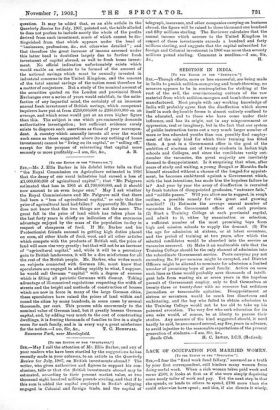SEDITION IN INDIA.
[To THE EDITOR Or THE " SPECTATOR.1 SIR,—Though efforts, more or less successful, are being made in India to punish sedition-mongering and bomb-throwing, no measure appears to be in contemplation for striking at the root of the evil, the ever-increasing outturn of the raw material from which sedition-mongers and bomb-throwers are manufactured. Most people with any working knowledge of India will probably agree that the disaffection which shows itself in such deplorable forms is almost entirely confined to the educated, and to those who have come under their influence, and has its origin, not in any misgovernment or oppression, real or imaginary, but in the fact that our system of public instruction turns out a very much larger number of more or less educated youths than can possibly find employ- ment of the only kind for which their training has fitted them. A post in a Government office is the goal of the ambition of nineteen out of twenty students in Indian high schools and Colleges, and since the candidates vastly out- number the vacancies, the great majority are inevitably doomed to disappointment. Is it surprising that when, after years of study and waiting, a young Bengali or Maratha finds himself stranded without a chance of the longed-for appoint- ment, he becomes embittered against a Government which, with the best intentions, has made him the hopeless failure he is ? And year by year the army of disaffection is recruited by fresh batches of disappointed graduates, "entrance fails," and "middle passes." Will you allow me to suggest, in rough outline, a possible remedy for this great and growing mischief ? (1) Estimate the average annual number of vacancies in the Government offices of each province. (2) Start a Training College at each provincial capital, and admit to it, either by examination or selection, a sufficient number of the most promising boys from high and mission schools to supply the demand. (3) Fix the age for admission at sixteen, or at latest seventeen, and the period of training at two years, after which the selected candidates would be absorbed into the service as vacancies occurred. (4) Make it an unalterable rule that the Training College should be the only channel of admission into the subordinate Government service. Posts carrying pay not exceeding Rs. 10 per mensem, might be excepted, and District Officers might be allowed to nominate for admission a limited number of promising boys of good family, Action on some such lines as these would probably save thousands of intern. gent lads from wasting six or seven years in the hopeless pursuit of Government employ, only to find themselves at twenty-three or twenty-four with no resource but seditious journalism or treasonable agitation. Disappointment at sixteen or seventeen would be much less disastrous and embittering, and the boy who failed to obtain admission to the Training College would not be too old to take up his paternal avocation. The very few who seek education for its own sake would, of course, be at liberty to pursue their studies. Any measure of the kind suggested should, it need hardly be said, be announced several, say five, years in advance, to avoid injustice to the reasonable expectations of the present generation of students.—I am, Sir, &c.,
Savile Club. H. C. IRWIN, I.C.S. (Retired).




























































 Previous page
Previous page